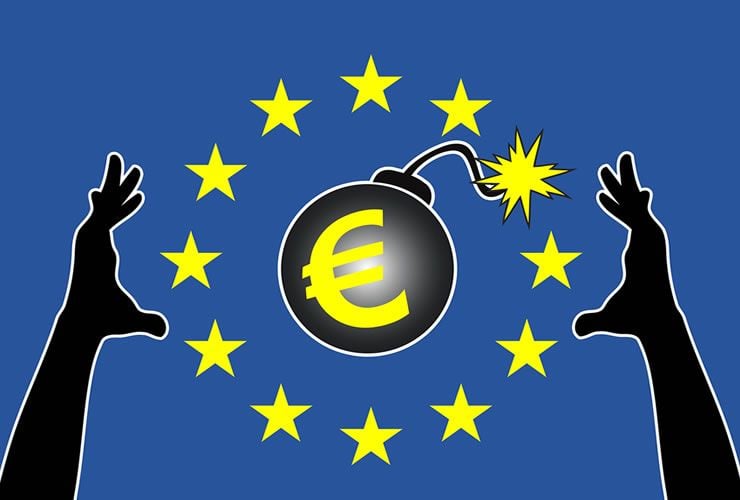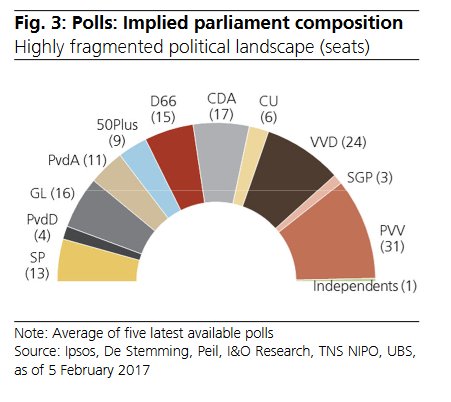The Dutch Elections and the Euro: Avoiding Nexit

The Dutch general election is fast approaching and is scheduled to take place on the 15th of March.
The latest polls put the PVV or Freedom Party, led by Geert Wilders, in the lead.
The risks of the PVV winning are clear as this is an anti-EU party that has a desire to see the Netherlands withdraw from the EU if it gains power.
There are widespread concerns the Netherland’s elections could be the first step in a sequence to a 'Nexit' and the break-up of the EU.
Such an outcome would be extremely negative for the Euro exchange rate complex, thus the election poses a major risk to the currency.
PVV Leading the Way
The latest polls place PVV in the lead with 31% of the vote, which is an increase from previous levels.
The Dutch electoral system is a proportional representation system, however, so the PVV’s 31% is still 19% short of the outright majority required to gain power.
Assuming it fails to gain the extra votes, it will either need to form a coalition with another party to make up the difference or try to rule with a minority, assuming a rival coalition cannot successfully form a larger majority.
The problem for PVV is that no other parties want to form a coalition with it.
The closest it came to gaining a potential coalition partner was the Liberal Party (VVD) led by the current Prime Minister Mark Rutte.
However, due to the leader of the PVV making incendiary comments against Moroccans, Rutte changed his mind and said "the chances that the VVD will rule with PVV are zero. It's not going to happen."
Analysts at UBS think the most likely outcome of the election is a ‘rainbow’ coalition of five or more parties not including the PVV.
“A broad coalition between Rutte's VVD and at least three, if not four or five other parties is the most likely outcome, in our view,” said UBS’s Ricardo Garcia in a note seen by Pound Sterling Live.
The next most probable scenario is a minority government which does not include the PVV, which has a 35% probability. This would likely be formed from a coalition of the Liberals and the Christian Democrats.
The third most probable outcome would be a coalition of the PVV and Rutte’s Liberals despite his assurances that this would not happen. Such a possibility has a 15-20% probability.
The final least likely possibility is an outright win for PVV, or even PVV forming a minority government, which UBS’s Garcia says has only a 0-5% probability of happening.
Worrying Trends
One trend to note is that support for Wilders increased during his trial for hate speech regarding Moroccans, suggesting he continues to strike a chord with the electorate.
Polls have often proven wrong lately when it comes to calling unfashionable outcomes, look at Brexit and Trump.
This is thought to be because people are ashamed to voice their support for the extremist when asked by pollsters, so they either say they don’t know or lie.
In the case of both Trump and Brexit most of the undecideds voted for the more reactionary party/candidate.
A Referendum on Nexit?
One major difference between the UK and Netherlands which may make it harder for Wilders to take the country out of the EU is the constitution.
In Holland referenda carry less weight than in the UK and cannot bind a parliament to the outcome.
Indeed, we have seen the Dutch government gain a reputation for having little regard for referendum results with the Ukraine-European Union treaty being given ascent by Holland despite the electorate rejecting such a move.
“A closer look at the Dutch legal framework for referenda reveals that a binding "Nexit" vote is not legally possible at this stage,” said UBS’s Garcia.
Yet, this could change under a Wilders government.
But even if there was a referendum on membership of the EU the Dutch population is more pro EU than the British electorate.
“Despite the substantial broadening of the PVV's voter base since the last election in 2012, Dutch citizens' support for the Euro and the EU is comfortably above the European average, as suggested by the latest Eurobarometer survey conducted by the European Commission,” states Garcia.
Therefore, we must conclude that although there is a risk of a surprise majority win for PVV, it would require a jump of more than 19% of the vote to gain an outright majority and rule the Dutch Parliament, which seems unlikely, notwithstanding recent shock results.
Even if PVV somehow gained power it would still find it difficult to get anti-EU legislation through the Upper House which has the power to block legislation, and does not have another election until 2019.
The mixed composition of the Upper House makes it impossible for Gilder’s to pass any extreme legislation until a possible re-election of the upper house in 2019 – assuming such an election would result in increased representation for his party in the Upper chamber.
As such the Euro is probably safe even if the support for radical nationalism is on the rise in Holland.





